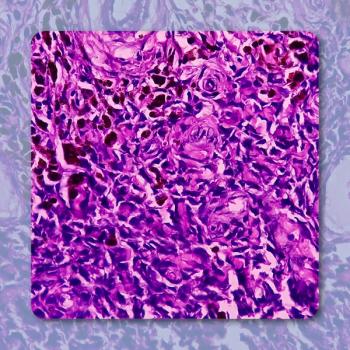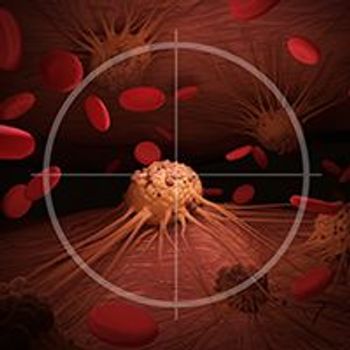
The investigational PRAME-targeted T-cell therapy IMA203 generated responses in melanoma and other solid tumors,

Your AI-Trained Oncology Knowledge Connection!


The investigational PRAME-targeted T-cell therapy IMA203 generated responses in melanoma and other solid tumors,

Phase 1 data showed the potential for invikafusp alfa as a precision cancer immunotherapeutic agent in solid tumors after exposure to PD-(L)1 therapy.

Patients with newly diagnosed glioblastoma had improved survival when treated with TTFields plus temozolomide and pembrolizumab.

E-602 plus cemiplimab elicited preliminary antitumor activity and had a tolerable safety profile in PD-(L)1–resistant solid tumors.

Administration of fixed-dose CAR T cells followed by escalating doses of UB-TT170 led to changes in cytokine levels in relapsed/refractory osteosarcoma.

THIO plus cemiplimab displayed durable activity in patients with advanced checkpoint inhibitor–resistant NSCLC.

Treatment with magrolimab plus docetaxel led to peripheral CD47 saturation in patients with advanced NSCLC, which correlated with improved outcomes.

Co-formulated vibostolimab and pembrolizumab plus chemotherapy failed to improve OS in the first line vs atezolizumab plus chemotherapy in ES-SCLC.

The biomarker analysis of patients enrolled on part B of the CheckMate 914 trial explored the effects of PD-L1 and KIM-1 expression.

Preclinical data suggest that DLL3-TOPAbody has antitumor activity and could provide a survival advantage in DLL3-expressing tumor cells, including SCLC.

DK210 (EGFR) showed evidence of wild-type IL-2 signaling, CRS mitigation, and immune response signaling in patients with solid tumors.

Siglec-15 was expressed in tumor cells and tumor-associated macrophages in tissue samples from non–small cell lung cancer and other solid tumors.

Radiomic biomarkers can predict treatment response through assessments of tumor growth in patients with metastatic uveal melanoma treated with roginolisib.

The Nectin-4/CD137 Bicycle–targeted immune cell agonist BT7480 had antitumor activity in patients with Nectin-4– and CD137-expressing tumors.

OncLive co-hosts Kristie L. Kahl and Andrew Svonavec talk to program co-chair Benjamin P. Levy, MD, to highlight what to expect in the latest oncology developments from the 42nd Annual Chemotherapy Foundation Symposium to be held in New York City.

Casdatifan was well tolerated and had durable clinical activity in patients with metastatic clear cell renal cell carcinoma.

IDE397 is the first MAT2A inhibitor to show clinical activity and safety in patients with MTAP-deletion urothelial cancer and non–small cell lung cancer.

The first-in-class CDK8/19 inhibitor RVU120 demonstrated early signs of clinical activity in patients with relapsed/refractory metastatic or advanced solid tumors.

RMC-9805 was proven safe and active in patients with previously treated, KRAS G12D–mutant pancreatic ductal adenocarcinoma.

Treatment with APR-1051 appears safe and well tolerated in patients with advanced solid tumors and select cancer-associated gene alterations.

TYRA-300 was safe and produced antitumor activity in metastatic urothelial cancer harboring FGFR3 alterations.

Oncology fellows with aspirations of entering the lung cancer field gathered in Chicago, Illinois, to share findings from their research, network, and participate in panel discussions featuring expert faculty

Oncology experts share notable clinical trials and up-and-coming therapies presented at the 2024 ESMO Congress.

MR-Linac adaptive radiotherapy plus temozolomide reduces CTV margins in high-grade glioma, according to results from the phase 2 UNITED trial.

Patients with WHO grade II/III recurrent meningioma experienced clinically meaningful efficacy with 177Lutetium-Dotatate.

The combination of nivolumab plus radiotherapy reduces rates of biochemical recurrence in gleason grade 5 prostate cancer.

Atezolizumab administered concurrently with chemoradiation failed to improve OS and PFS outcomes compared with standard chemoradiation alone in LS-SCLC.

MRD negativity was sustained at 1 year following the cessation of maintenance lenalidomide in multiple myeloma.

The second-generation, BCMA-directed CAR T-cell therapy HBI0101 led to an objective response rate of 92% in patients with relapsed/refractory multiple myeloma.

Binod Dhakal, MD, discusses survival data with ciltacabtagene autoleucel in lenalidomide-refractory relapsed/refractory multiple myeloma.